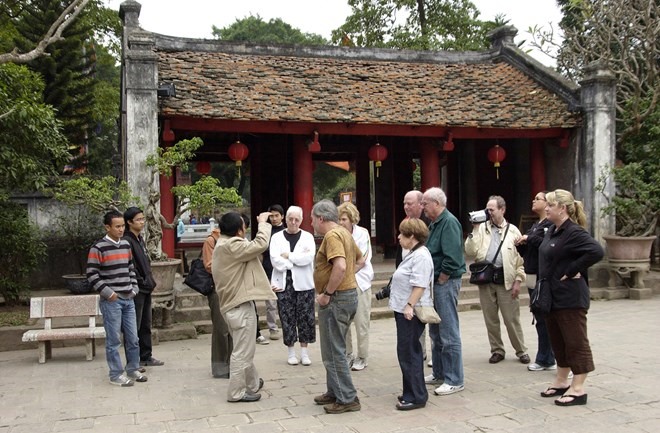 Society
Society

The tourism industry in Việt Nam has developed so quickly in recent years that it doesn’t have enough qualified people to serve travellers.
 |
| Foreign tourists visit Văn Miếu Quốc Tử Giám (Temple of Literature) in Hà Nội. — VNA/VNS Photo Anh Tuấn |
HÀ NỘI — The tourism industry in Việt Nam has developed so quickly in recent years that it doesn’t have enough qualified human resources to serve such growth.
According to a forecast by the Việt Nam National Administration of Tourism (VNAT), by 2020, the tourism industry will need more than two million people directly providing tourism services, not including the labourers supplied to cruise tourism, the Người Lao Động (Labourer) online newspaper reported.
At present, there are more than 1.3 million workers in the tourism industry nationwide, accounting for 2.5 per cent of the nation’s total labour force.
Only 42 per cent of these workers are trained in tourism, 38 per cent have moved from other sectors and 20 per cent have had no official training. This means the industry lacks skilled and experienced employees and has too many unskilled workers.
Each year, tourism schools meet only 60 per cent of the sector’s demand, leading to a serious shortage of tourism human resources.
Nguyễn Văn Mỹ, chairman of the management board of Lửa Việt Tourism Company, agreed that the tourism sector seriously lacked trained employees, especially tour guides.
Statistics from VNAT showed that in 2017, the country welcomed more than 13 million international visitors while domestic tourist arrivals stood at 73 million. However, there are only 13,000 workers who directly serve foreign tourists, he told the Thanh Niên (Young People) newspaper.
“Our workers presently meet only 50 per cent of actual demand,” Mỹ said.
According to Mỹ, to ensure basic human resources, local tour guides need to increase five to six times.
Deputy Dean of Duy Tân University in Đà Nẵng City, Dr Võ Thanh Hải, said that tourism industry in many localities, especially in the centre, had been developing strongly, but the number of students participating in related subjects was still limited.
Manpower for resort management was also extremely scarce, so tourism businesses were certainly in difficulty, he said.
Mỹ said that the biggest limitation on human-resources training was the big gap between academic theory input and practice.
“Most Vietnamese students learn a great deal of theory at school, but have few chances of putting it into practice,” Mỹ said.
“Tourism businesses have to train them again because most of them lack occupational skills,” he added.
According to experts, students need to be given work-based learning experiences with meaningful jobs during their placements. However, there are not many tourism companies or tour operators willing to provide them with jobs or practical experience. Vietnamese tourism students are mostly unable to undertake the tasks after graduation.
A manager at Park Hyatt Hotel, Trương Tấn Lợi, said it was hard to find workers who meet professional skills and foreign language skills.
Dr Hải told the newspaper that the Ministry of Education and Training had allowed experienced tourism companies to co-operate with universities in training to have more qualified students because most Vietnamese tourism students lack practical experience.
To meet the increasingly stringent requirements, more co-operation was needed between universities and enterprises to provide sufficient practical training, Lợi said.
“Skilled employees in hotels and tourism companies are people who are enthusiastic and have practical experiences that can be shared and communicated to students. It will help students to better understand the situations and difficulties of this industry," said Lợi.
At present, many universities have co-ordinated with tourism businesses to help students access specific situations in the profession.
From the second year in study, students will spend more than two months in hotels, restaurants and tourism enterprises to learn occupational skills, said Trần Hải Nam, a manager from HCM City Technology University.
Many universities have also focused on diversity of training and improving foreign language skills for students who are future tourism workforce. — VNS




